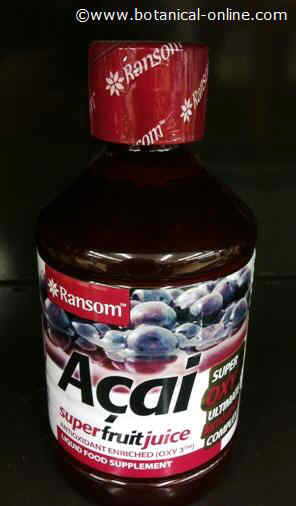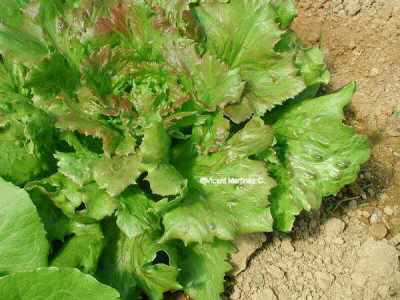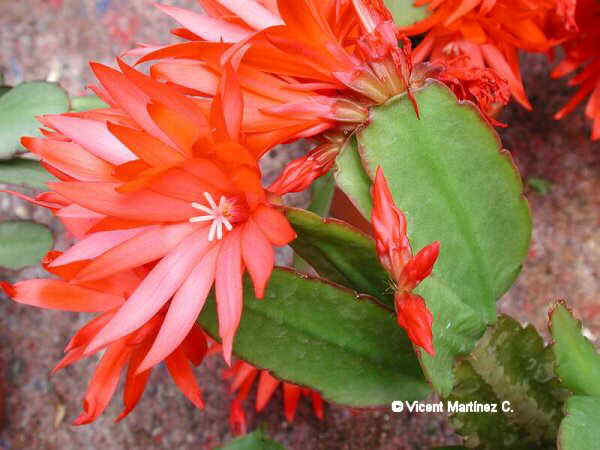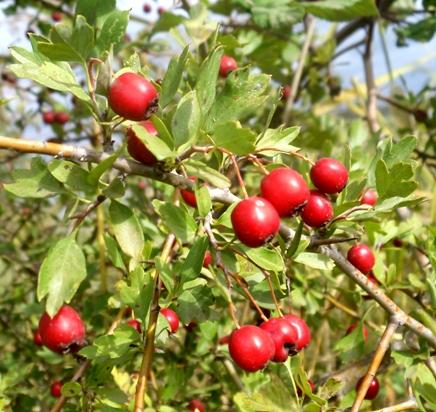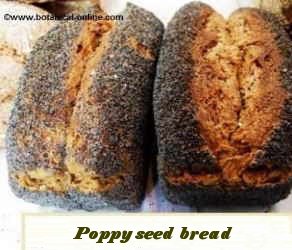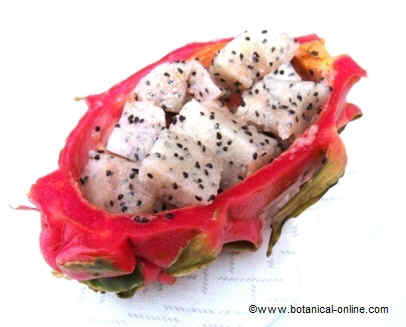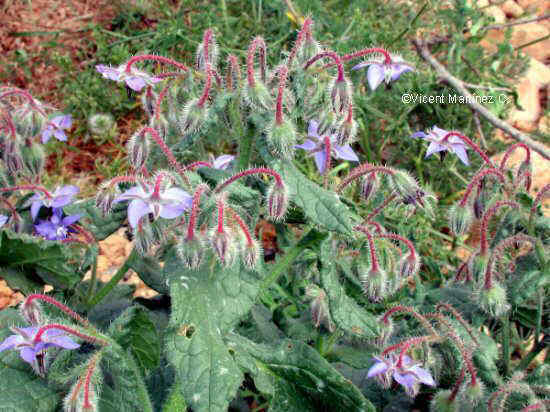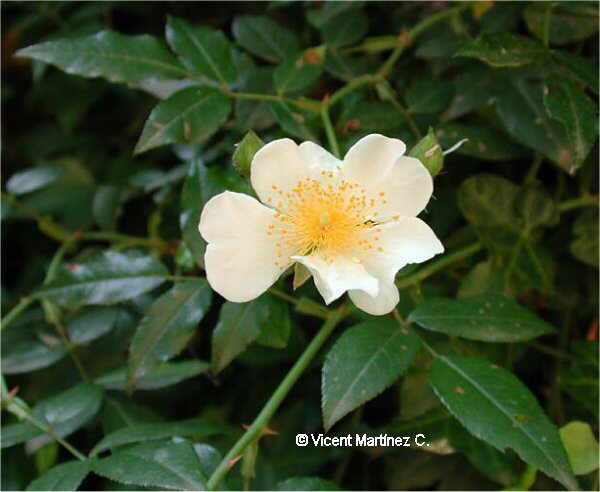Contents
- 1 Medicinal properties of rocket
- 1.1 BENEFITS OF ROCKET
- 1.2 Is rocket good for health?
- 1.3 Stimulant properties
- 1.4 Rocket for your eyes
- 1.5 Anti-scorbutic, anti-anemic and revitalizing properties of rocket
- 1.6 Rocket, digestive remedy and an appetizer
- 1.7 Rubefacient properties of rocket
- 1.8 Antioxidant and anti-cancer properties of rocket
- 1.9 Anthelmintic properties of rocket
- 1.10 Rocket as diuretic
- 1.11 Rocket for the liver
- 1.12 Rocket toxicity
Medicinal properties of rocket
BENEFITS OF ROCKET
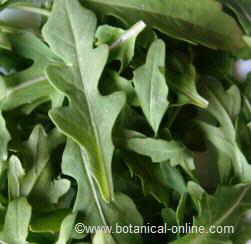
Is rocket good for health?
Rocket or arugula is a common vegetable in the whole Mediterranean region consumed since ancient times as a vegetable and for its medicinal properties.
As an example we can mention Dioscorides, who spoke about the medicinal properties he had observed of this valuable plant: “Eating raw, in bulk, rocket stimulates lust. It has the same power the seed, and, alien to this, it causes the urine, serves digestion, entertains lewd belly, and it is used to cook the food. Kneed it with milk and vinegar, and give it the form of some pills, to be kept in longer. A wild rocket grows, mainly in Spain, which serves the people of that place instead of mustard. This moves more powerfully the urine and it is much sharper than the domestic one. ”
These are just some of the many medicinal properties that the rocket has, and that modern science has confirmed:
Stimulant properties
Read about its aphrodisiac properties and its stimulant plants.
Rocket for your eyes
Formerly, the Talmud and AbúlFadlí used the word “Oroth” to describe the rocket. ‘Oroth’ means light, and is related to Pliny, who attributes the property to clarify the view. Indeed, the rocket has an extraordinary amount of vitamin A as carotene, a potent natural antioxidant for your sight.
Vitamin A is an essential nutrient to prevent eye problems and cure night blindness. It appears in the form of carotenoids throughout the kingdom of plants, especially in those more ‘colorful’ foods.
Perhaps because of these qualities, rocket appears named in the Book of Kings (II Kings 4:39 – 40) of the Bible, quoting: “[…] one of them left the field to gather oroth” corroborating once again the importance of arugula in the diet of people since ancient times.
Anti-scorbutic, anti-anemic and revitalizing properties of rocket
Rocket, like its relatives, watercress and mustard posses antiscorbutic properties. Scurvy is a disease caused by deficiency of vitamin C, although this disease is rare in today’s society, where fresh vegetables are consumed daily.
The antiscorbutic properties of arugula were prized in antiquity for being a vegetable available all year round, even in winter. It was cultivated as a vegetable for salads or cooked like spinach. (See cultivation details)
It was considered a revitalizing plant, indicated for people with fatigue, psychophysic weakness and convalescence, probably due to its contribution in iron and folic acid, which makes this plant food a remedy for anemia.
Rocket, digestive remedy and an appetizer
Aperitive properties are characteristic in plants with a bitter taste such as rocket. Rocket or arugula is a plant with stomachic properties, such as it has been demonstrated by the medical tradition and recent studies.
Its anti-ulcer activity is attributed to its antioxidant properties and prostaglandins that cause less gastric acid secretion. Furthermore, rocket also has emollient properties, capable of softening fabrics and decrease inflammation. (use it externally in poultices for inflamed areas)
Despite being a strong bitter, unlike other bitter foods, arugula is recommended in people with dyspepsia or stomach pain, stomach ulcers and heartburn. (You can eat the fresh plant or take a tea made with the leaves)
Rubefacient properties of rocket
Being from the same family as watercress and mustard, rocket shares with these plants the sulfur compounds, that give it the spicy taste of the leaves and seeds of these plants.
These compounds consumed in quantity, have a rubefacient effect, That’s to say, they cause reddening of the skin and produce a sensation of heat that was already described in ancient treatises of herbal medicine, as Dr. Laguna said: “Rocket heats powerfully, and therefore can not be eaten unless mixed with lettuce or some other cold grass, seeing that, if you eat it alone it offends the brain. ”
In fact, rocket was a spice used in Italy at the time of Pliny, saying that the Latin name of the plant derived from the same flavor “quid erodat”. “Eruca urere” comes from the Latin, meaning “burner”, referring to the fact that the consumption of arugula “warms the body”.
Also, by this quality of heating the body or rubefacient, says José Oriol Ronquillo in his book of Commercial Matters (1851), “the arugula should not be taken over by young people or those having irritable temperament.”
Antioxidant and anti-cancer properties of rocket
However, these sulfur compounds contain glucosinolates, which break down in the body to isothiocyanates. They exercise an important antioxidant property to help keep the body healthy. They are also responsible for the pungent flavor of the crucifers. Numerous studies have investigated the antioxidant properties of isothiocyanates, concluding that they are a powerful medicinal agent.
Recent research has studied the role of isothiocyanates in the prevention and treatment of cancer as well as that role of phenols and carotenoids which seem to contribute to this end. By means of these components, rocket possesses tumoricidal, apoptotic (causing natural death of damaged cells), antimutagenic and antidegenerative properties.
(More information on Cruciferae against cancer)
Anthelmintic properties of rocket
Pliny relates that an infusion of rocket seeds was used to fight intestinal worms.
Dr. Andres Laguna, who reviewed and completed the work of Dioscorides, quote: “Its seed, once drunk, is useful against the scorpion punctures, kills the worms of the belly and so dulls the senses of man than whips and torments do not give him any grief. Mixed with honey and applied, purifies all stains of the face. Licked in the same way, it removes with great ease chest thick humours. ”
Rocket as diuretic
The Latin etymology vesicaria (Eruca vesicaria) is not exactly defined. While some authors believe that it refers to the appearance of its leaves in the form of vesicles, others believe it stems from the fact that it stimulates the urinary bladder.
The sulfur compounds are responsible for stimulating urination, although these effects are much more effective in the mustard seeds.
Rocket for the liver
Traditional Chinese medicine believes that bitter plants and green leafy plants, such as dandelion or arugula, have beneficial effects on the liver.
These plants grow in spring, and nature gives them to us to cleanse our body of excess of animal fats consumed in winter, (pork fat, dairy or nuts).
Plants with these characteristics possess strong antioxidant properties. they are high in fiber and vitamins and low in fat and calorie intake. In short, rocket is ideal for introducing it as a vegetable in times of thinning, after copious holidays or during weekly days to balance our diet.
Scientific studies support the hepatoprotective power of the rocket. Ideal for introduction in the diet of people with high cholesterol and to add in the menu of cleansing diets.
Rocket toxicity
- The consumption of rocket leaves in salad is not a health risk.
- The toxic components of rocket are found in its seeds that are not often consumed as food, or not taken in sufficient quantity to cause toxic reactions.
- The seeds of rocket in doses of 15% (infused) have emetic effect. The sulphurous essence of the seed is irritant and rubefacient.
- Glucosinolates are goitrogenic, so, large doses can have toxic effects on the thyroid gland.
- For animals, the dry seeds of rocket are used as grass. However, a high intake of these can cause irritation of the mucous membranes and to give a strong smell to the milk they produce.
![]() More information about rocket.
More information about rocket.

